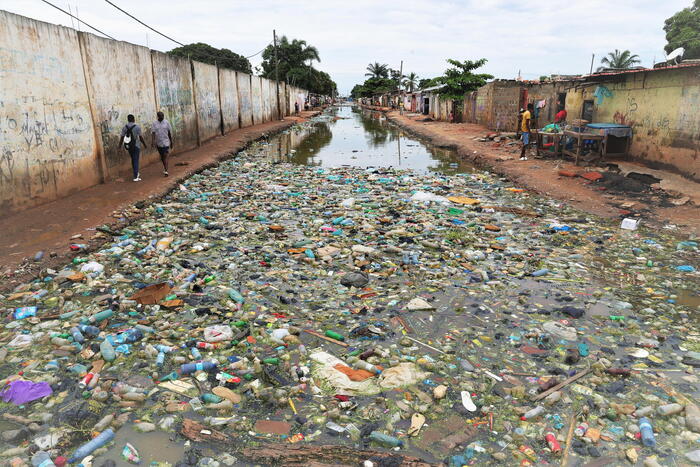By Aria Bendix -
NBC News
Pollution shortens more lives in the world than war, terrorism, malaria, HIV, tuberculosis, drugs or alcohol.
This is the conclusion of a report published Tuesday in The Lancet Planetary Health, which looked at the combined health risks of air, water and toxic chemical pollution in 2019. The results show that pollution is responsible for around 9 million premature deaths each year, or one in six globally.
That puts its impact on par with smoking.
"We haven't been yelling from on high: 'Look at this!'
high enough," said Richard Fuller, the lead author of the report and the founder and CEO of the nonprofit organization Pure Earth, which focuses on tackling pollution in low- and middle-income countries.
The Shell Norco manufacturing complex, an oil refinery, is seen in this aerial photograph about 10 miles up the river from New Orleans.Gerald Herbert/AP
Fuller's report is one of two this week that have sounded the alarm about the danger of contamination.
The second study, published Monday, focused on the United States and estimated that
53,000 premature deaths a year could be avoided in the country if all energy-related emissions were eliminated.
Fuller's study found that more than 90% of pollution-related deaths occur in low- and middle-income countries.
Those with the highest rates in 2019 were India, China, Nigeria, Pakistan and Indonesia.
Air pollution -- from sources such as vehicles, power plants and crop burning -- is the most serious threat, responsible for more than 6.5 million deaths in 2019, more than any other form of pollution that year. anus.
Air pollution increases the risk of heart disease, respiratory infections, lung cancer, tuberculosis
, chronic respiratory diseases, diabetes, kidney disease, and low birth weight, all of which can lead to premature death.
A changing mix of pollution types
Pollution-related deaths have been stable around the world since 2015, according to Fuller's research.
An earlier study of his showed that pollution was also responsible for 9 million premature deaths in 2015. But the dominant forms of pollution have changed over time.
Their new report suggests that deaths from air and water pollution in homes have fallen since 2000, while deaths from outdoor air pollution and toxic chemicals have risen more than 66% since then.
This is due, in part, to the growth of developing economies, a process that generally leads to improvements in household sanitation, while increasing the use of industrial chemicals and fossil fuels, according to experts.
“It is a problem that is getting worse.
When there's a lot of population and a lot of pollution, there's more mortality from it,” said Richard Peltier, an associate professor of environmental health sciences at the University of Massachusetts Amherst, who was not involved in either study.
Scientists have also identified increasing amounts of toxic chemicals in household items such as spices, paint, children's toys, and cosmetics.
In 2019, lead and other chemicals were responsible for 1.8 million deaths worldwide, up from 900,000 in 2000, according to the report.
Lead alone now kills more people worldwide than HIV, Fuller said.
Other forms of chemical contamination may be seriously underestimated, she added.
"We're not measuring mercury, pesticides, chromium, arsenic or asbestos," he said.
“If we were to properly measure all the different chemical exposures, it would probably be as big as air pollution.”
How to reduce the deadly threat of pollution
Experts say it is generally difficult for people to protect themselves from pollution-related health hazards, especially in less developed countries.
“You can wear masks when there is a lot of pollution
, if you have, say, a community wildfire,” Peltier said, “but that is not something that is sustainable or even achievable in many parts of the world.”
In smoky conditions, N95 masks offer the best protection, according to a 2021 study.
People can also install air filters in their homes, Peltier said.
But the best form of protection is probably to monitor outdoor air quality and stay indoors when it's not adequate.
"When we see that it's cloudy maybe we'll postpone running for that afternoon," Peltier said.
On a larger scale, experts say, countries need to devote more funds to pollution control.
"If a dollar could be spent to solve the problem, I would spend that dollar in the transition of energy economies towards the search for cleaner resources
, whether it is the implementation of electric vehicles [or] the adaptation of power plants to fuels cleaner-burning fuel," Peltier said.
The United States has already greatly improved air quality: Between 1990 and 2020, the country saw a 78% drop in combined emissions of six common pollutants.
But Monday's study underscores that much remains to be done.
If the US eliminated emissions from road vehicles, for example, it could prevent an estimated 11,700 premature deaths, according to the study.
Eliminating emissions from the electricity sector could prevent another 9,300 deaths.
"We have the technologies to get to a zero-emissions power sector across the country," says Nicholas Mailloux, lead author of the study and a graduate student at the University of Wisconsin-Madison.
"Some other sectors will be more complicated, like aviation."
"Obviously, that doesn't happen overnight," Mailloux added.
“There will be a decades-long process to reduce emissions at the scale we show.”
Even if America's pollution levels are reduced further, the health benefits may not be uniformly perceived.
Mailloux's study found that reducing emissions in the Southwest would primarily benefit Southwest residents, while reducing emissions in Rocky Mountain states such as New Mexico and Utah would have strong spillover effects. in the Midwest, Southeast, and parts of the South.
The more states and regions coordinate their efforts, Mailloux said, "the more benefits are gained everywhere."















